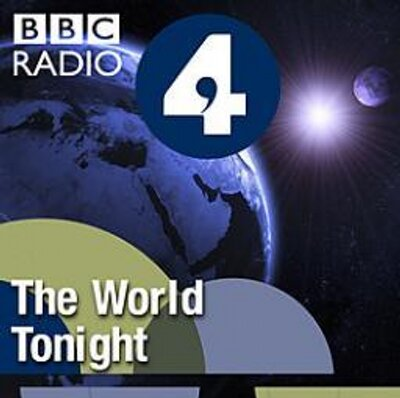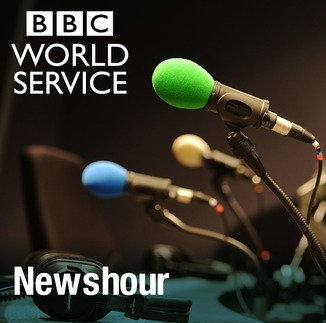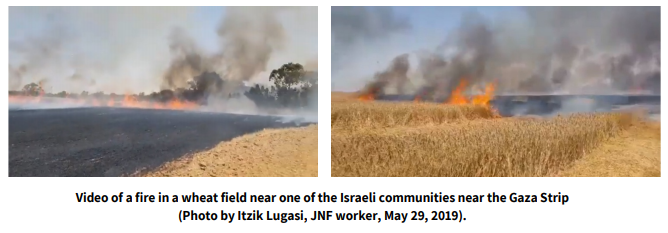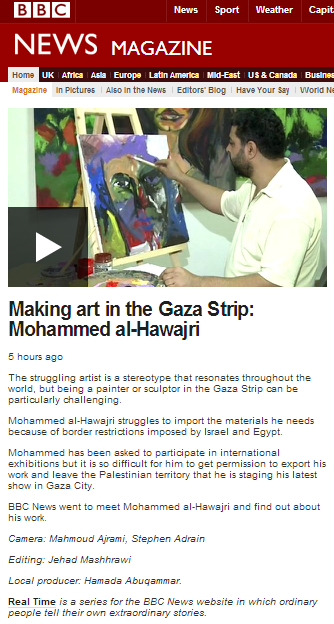h/t AM
With the BBC now having produced over a week’s worth of reporting on the ‘Great Return March’ publicity stunt organised by Hamas and additional terror factions in the Gaza Strip together with foreign Muslim Brotherhood linked activists, we can begin to identify patterns of reporting in the corporation’s multi-platform coverage.
One theme that has been repeatedly evident on a variety of platforms is context-free promotion of the Palestinian demand for ‘right of return’. BBC audiences have not however been told on what that demand is based, what its aim actually is, what it means for the internationally accepted ‘two-state solution’ or why the people making that demand continue to be categorised as refugees.
BBC radio portrayal of the ‘right of return’ – part one
BBC radio portrayal of the ‘right of return’ – part two
On April 6th a spin-off from that theme appeared: the description of Israel as “ancestral lands” of Palestinian refugees:
BBC reporting on Gaza border rioting continues to avoid core issue
One may have thought that BBC editorial guidelines on accuracy and impartiality would have prompted the use of terminology such as “what Palestinians see as their ancestral lands” (particularly seeing as only two years of residency in Mandate Palestine is required to meet the UN definition of refugee) but that was not the case in either the written article or in radio reports promoting the same theme.
The April 6th edition of the BBC Radio 4 programme ‘The World Tonight’ included an item (from 29:05 here) billed thus:
“Palestinians say Israeli troops have killed at least six people on Gaza’s border with Israel. As Israel is criticised by human rights groups inside and outside the country we hear from a military spokesman.”
Presenter Chris Mason introduced that item as follows: [emphasis in italics in the original, emphasis in bold added]
Mason: “When you hear or use the word smokescreen, the chances are the conversation is actually indulging in a spot of imagery about a ruse designed to disguise someone’s real intentions. But along the eastern borders of the Gaza Strip today, a smoke screen was a literal description of the tactic deployed by Palestinians. The choking black clouds – the result of burning tyres – had a simple purpose: make it harder for Israeli soldiers on the other side of the border to shoot protesters in Gaza.”
Obviously listeners would be likely to erroneously conclude from that portrayal that anybody and everybody protesting “in Gaza” is liable to be shot – rather than those engaged in violent rioting right next to the border fence or attempting to infiltrate it. Mason then promoted another falsehood with the claim that all Palestinian refugees were “forcibly displaced”.
Mason: “This was the second week of a planned six-week protest set to end on the 15th of May – the 70th anniversary of the Palestinian ‘Nakba’ or catastrophe in which more than 750,000 Palestinians were forcibly displaced by Israeli forces in the Arab-Israeli war of 1948.”
He continued with promotion of another now well-established theme: unquestioning repetition of casualty figures provided by the “Palestinian health ministry” – but without clarifying that the ministry concerned is run by Hamas – one of the organisers of the publicity stunt.
Mason: “Today six Palestinians were killed by Israeli forces according to the Palestinian health ministry and – as they did last week – the forces fired teargas to repel those at the border.”
Listeners then heard the “ancestral lands” theme.
Mason: “The protesters are demanding that refugees be allowed to return to ancestral lands that are now in Israel but Israel says the militant group Hamas which dominates Gaza is staging the rallies in order to launch attacks. Our correspondent Yolande Knell has spent the day with a 72 year-old Palestinian man who was one of the protesters today.”
Knell: “This is Jabaliya; one of eight refugee camps in the Gaza Strip. It’s really overcrowded. The streets are narrow with breeze-block buildings. I’ve come to the home of a retired English teacher Ahmed Abdullah to hear his story.”
Abdullah: “Here are the deeds. This was recorded in 1940 through the British Mandate. My mother took me there and she showed me every inch belongs to me.”
Knell: “Ahmed and his mother were the only survivors from their large family in the fierce fighting that followed the creation of the State of Israel. He comes from Hulayqat village, just to the north of Gaza but was brought up here. His family’s land is now an agricultural community in Israel.”
Listeners were given no context whatsoever to that story. They were not informed that Hulayqat was located along the route linking Jewish communities in the Negev to the centre of the country or that in the rioting that preceded the War of Independence, together with the inhabitants of two more hostile neighbouring villages, the residents of Hulayqat regularly harassed Jewish travelers along that road and blocked it. Neither were they told that armed Egyptian volunteers were already located in the area or that Hulayqat was the site of a British military post from which it was possible to control the route to the Negev. With the expectation of invasion by Arab armies, immediately before the War of Independence began the Palmach conducted Operation Barak in order to prevent the Jewish communities in the Negev from being cut off by the Egyptian army. Hulayqat was taken on May 13th 1948.
Knell’s interviewee went on:
Abdullah: “Now Israelis called it Heletz. They built a moshav on the land, on the village, and called it Heletz. Because the Israeli thought one day that the oldest will die and the smallest will forget. We cannot forget. We cannot forget. We know that this is our country and one day we will return back. One day. After 10 years, after 50 years, after 1,000 years – we will return back.”
Knell: “How do you feel about the protests that have been taking place here?”
Abdullah: “I’ve been there. I should be in the front. I lived the whole tragedy. I lived all my life as a refugee. They are talking about my life, about my land, about my future for my sons and grandsons. All people, all the people in the whole world they have countries. They live in countries. We as Palestinians, our country live inside us.”
Knell: “But Israel completely rejects the Palestinians’ right to go back to that land. Is it realistic to keep talking about the right of return to those villages?”
Abdullah: “Of course. It is like an [unintelligible]. We started in Gaza; we began to put pressure on the Palestinians who [unintelligible] to move, move you are a refugee not to leave us alone in Gaza and we will ask the Palestinian refugee in Lebanon to move and also the Jordanian. We want to return back.”
Although it has been clear in some of her other reports that Yolande Knell knows full well that Hamas is one of the co-organisers of this publicity stunt – and is also financing it – listeners then heard another recurrent theme: the downplaying of Hamas’ involvement.
Knell: “When the Israelis say it’s just Hamas that’s trying to stir up violence…”
Abdullah: “It is not Hamas. It is not Hamas. It is people. I’m not Hamas. I don’t believe in Hamas thoughts. I’m secular, not religious. So I took a part.”
Knell: “So you think they’re just one of the parties?”
Abdullah: “Yes but they [Israel] want to cover it with Hamas to show us as we are terrorists. We are not terrorists. We are the victim of terrorism.”
Knell: “So Ahmed, you and some of your 25 grandchildren and I have come now to the protest camp east of Jabaliya on the border with Israel. There’s a big crowd here and we can see Israeli soldiers by the fence across a field. There are tyres burning. There’s been some tear gas fired. It feels very dangerous. The idea is to continue these demonstrations until the middle of May. Are you ready to keep coming back?”
Abdullah: “Yeah. We are not fed up. We are not tired. We will continue day by day. We are on the right way to implement our right of returning to our home and land.”
That item continued with Chris Mason interviewing the head of the political NGO B’tselem about his organisation’s call for Israeli soldiers to disobey orders (also promoted in a written BBC report on the same day) and that was followed by an interview with an IDF spokesperson.
A TV version of Yolande Knell’s one-sided and totally context-free amplification of the Palestinian demand for ‘right of return’ was also seen by viewers of BBC Four’s ‘World News Today’ and an edited version of Knell’s interview with Ahmed Abdullah was heard by listeners to the April 6th evening edition of the BBC World Service programme ‘Newshour’ (from 18:05 here), with presenter Julian Marshall once again unquestioningly quoting Hamas casualty figures and telling listeners that:
“…in similar protests last Friday in support of the demand that Palestinian refugees and their descendants be allowed to return to their ancestral homes in what is now Israel, 16 Palestinians lost their lives.”
Listeners to an earlier version of ‘Newshour’ on the same day (from 49:32 here) heard similar promotion of Hamas-supplied casualty figures that have not been independently verified by the BBC and were told by Yolande Knell that:
“The Palestinians…they’re calling for the right of those original 1948 Palestinian refugees and their descendants in Gaza – which is about 1.3 million of the 2 million population – to be allowed to go back to their land which is now in Israel. Israel has long rejected such a claim but the Palestinians here say they’re going to keep up these protests until the middle of May when it will be the 70th anniversary of the creation of the State of Israel when those hundreds of thousands of people were forced to leave their homes or forced to flee.”
The BBC has now had well over a week in which to provide its audiences with the background which would facilitate their understanding of why Israel (and the pro two-state solution international community) ‘rejects’ the Palestinian demand for ‘right of return’. In light of its continued failure to produce any such reporting, one can only conclude that the BBC’s intention is not to meet its remit as a supplier of “impartial news and information” but to provide amplification for that anti-Israel political campaign.
Related Articles:
Hamas agitprop requires BBC journalists to brush up on UN resolution
British connections to upcoming Gaza agitprop ignored by BBC News
BBC News claims Gaza stone throwers engaged in ‘peaceful demonstrations’
BBC again fails to adequately clarify Hamas’ role in Gaza border agitprop
BBC radio portrayal of the ‘right of return’ – part one
BBC radio portrayal of the ‘right of return’ – part two
BBC Radio 4 dusts off the ‘expert’ hats and ‘disproportionate’ meme
No BBC reporting on preparations for upcoming Gaza border stunt
BBC reporting on Gaza border rioting continues to avoid core issue




